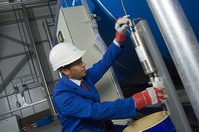 Plant operators could be wasting thousands of pounds in fuel because their water treatment supplier is failing to monitor the phosphate levels of raw water for their steam systems. And the situation could get worse as water utilities strive to meet tightening European drinking water regulations.
Plant operators could be wasting thousands of pounds in fuel because their water treatment supplier is failing to monitor the phosphate levels of raw water for their steam systems. And the situation could get worse as water utilities strive to meet tightening European drinking water regulations.
According to the European Drinking Water Directive, water supplies must not exceed 25 microgrammes of lead per litre of water, reducing to 10 microgrammes from 25 December 2013. To meet these limits, water utilities commonly dose water with phosphate to inhibit lead from old pipes leeching into the water supply.
However, many steam system operators may not be taking account of these added phosphates, so are not adjusting their water treatment regime accordingly. Consequently, excessive phosphate levels could cause scaling of the internal surfaces of steam boilers, reducing their efficiency significantly.
“This is a largely unrecognised problem that is costing some operators dearly in higher fuel bills,” says Richard Cumber, Steam System Conditioning Manager, Spirax Sarco. “Our experience shows that there is a significant drop of up to 10% in energy efficiency with phosphate-scaled boiler systems. I have been to sites where, during a boiler’s annual inspection, scale is being removed by the dustbin load.”
To solve the problem, steam system operators need to ensure their water treatment supplier is measuring phosphate in the incoming water supply.
“The problem has arisen because most water treatment suppliers only measure phosphate levels in the boiler itself, not the incoming water supply,” explains Cumber. “What is needed is a water treatment regime that takes into account water quality throughout the steam system, not just inside the boiler.”
Cumber also recommends that steam system operators instigate simple and quick weekly in-house tests with a basic test kit costing just a few hundred pounds.
“The level of water utilities’ phosphate dosing not only varies from region to region according to the local water hardness, but can change significantly from one day to the next. If not catered for, phosphate levels can go out of specification and cause boiler scaling very quickly. Waiting for the monthly visit by the water treatment supplier could be too long, with the boiler becoming less efficient by the day,” Cumber concludes.
Reader enquiries: Sharon Graves, Marketing Communications Manager
Spirax Sarco, Charlton House, Cheltenham,
Gloucestershire, GL53 8ER
Tel: 01242 521361; Fax: 01242 573342
Email: This email address is being protected from spambots. You need JavaScript enabled to view it.
Web: www.spiraxsarco.com/uk

